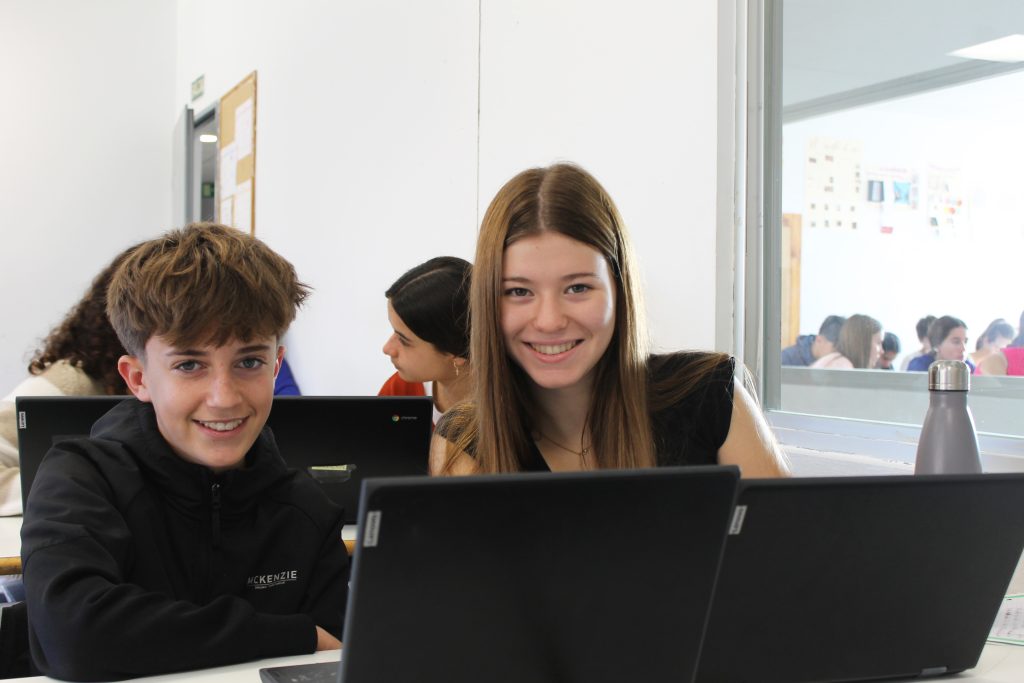Secondary Education
Split schedule from 8:30 AM to 5:00 PM
During this time, 8 daily sessions are held across the 4 years of Secondary Education, with two breaks—one in the morning and one after lunch.
Our dynamic, active, and interdisciplinary system prevents fatigue from settling in among students.
Educational Project:
- Students are the protagonists of their own learning, using an active and experiential methodology across all areas.
- Learning process focused on the development of competencies, skills, and values.
- Monthly educational visits will be the best way to transfer the knowledge acquired to other contexts and environments, with direct contact with the learning itself. The classroom is not the center of their learning—science, technology or arts labs and nature itself are the real learning settings.
- Participation in the learning process of the entire educational community (families, teachers, students, school staff).
- Freedom and encouragement of individual autonomy, taking on both individual and collective responsibilities, while boosting self-esteem.
- Participation in solidarity projects. Social and environmental commitment.
- Volunteering program.
- Erasmus+, short-term immersions, and academic stays abroad.
- Diversity and interculturality through communication.
- Coexistence plan for conflict resolution, using the Mediation Plan developed at school, where students are the protagonists.
- Reinforcement of cooperative and team work to develop interpersonal intelligence, while also fostering intrapersonal intelligence through autonomy and self-confidence.
- Curricular subjects are distributed across research centers that serve as the basis for projects: cultural, social, scientific, and technological research.
- Specific curricular subjects offered.
- Based on three core pillars: languages, sports, and technology.
- Enseñanza curricular Basic curricular teaching reinforced through project-based learning and optional complementary programs.
- Active methodologies based on student-led learning and discovery.
- Various assessment tools and criteria, with written tests being just one part of how students are evaluated in their daily progress. Grades consist of 50% written tests and 50% daily work (presentations, projects, models, timelines, etc.).
- Development of students’ critical thinking by emphasizing reasoning when responding to different challenges.
- Oral expression is a key part of the evaluation through various presentations and projects during their school years. Both content and delivery are assessed.
- Introduction to the Flipped Classroom methodology, where the student switches roles with the teacher and becomes the real driver of the sessions.
- Academic and career guidance in the final year of Secondary.
- Guidance Department to address educational needs, as well as to develop study skills and subject organization.
- No textbooks are used except in English. Students use their own materials through GSuite tools: Classroom, Drive, etc.
With this platform, students can collaborate, view deadlines instantly, submit work online, and most importantly, follow the course in a personalized, secure, and efficient way.
Estudiantes Project:
Reinforcement of the English language with ENGLISH ADVANCE, where students learn to use common expressions and understand the context of new vocabulary. An opportunity to communicate orally in British English. Official Cambridge exam preparation is also included, developing the key skills (speaking, writing, listening, and reading).
- Development of study techniques and help with organizing daily work through specific sessions.
- Opportunity to learn basic concepts of a new language such as Chinese or German, complementing the learning of other languages. A new way of language learning that opens students’ minds through phonemes and written symbols.
- Learning through Artistic Expression and Choir (1st and 2nd years of Secondary), using tools to enhance communication, reflection, and self-confidence.
- Public Speaking (3rd and 4th years) reinforces critical and ethical thinking, intercultural understanding, and communication skills, so students can express themselves freely and independently.
- Development of communication skills through the Writing and Public Speaking Workshop (3rd and 4th years).
- Introduction to financial education through activities and dynamics that promote these competencies within the school environment.
- Choir group enhances artistic expression and encourages public performance.
Project-Based Learning:
- Based on student leadership and created through cooperative work.
- Various projects are carried out throughout the year, distributed by term, aiming to spark each student’s intrinsic motivation.
- Each research center develops different projects in an interdisciplinary way, combining various content areas and tools to support the development of key competencies.
- Projects take place both in the classroom and during planned educational visits.
- Final outcomes or research results may be exhibitions, workshops, models, group/individual presentations, or the presentation of a theory.
- Different subject areas are interrelated around a common theme.
Projects are a fundamental part of student evaluation and a key element of our active methodology.
Multilingualism (Spanish, English, Chinese, and French):
Daily English sessions with 8 sessions per week, taught by native-speaking teachers and assistants.
We use various Cambridge materials tailored to students’ proficiency levels, in accordance with the Common European Framework of Reference for Languages (CEFR).
Students not only learn the language, but also explore culture and intercultural connections. Multilingualism is integrated across the curriculum to understand today’s interconnected world.
Students are grouped by proficiency level to strengthen their weaker skills and reinforce their strengths.
In the bilingual section, Science and Physical Education are also taught in English.
Different publishers are used according to CEFR levels and competencies.Daily reinforcement of speaking and listening skills, using Only English in the classroom.
Development of curricular projects entirely in English, along with project presentations in the language.
Emphasis on grammar and common expressions to ensure fluency in spoken and written English, enabling real communication from day one.
Opportunity to learn a second foreign language: French or German (depending on demand), and a third language such as Chinese as part of the optional program.
Students in 2nd, 3rd, and 4th years of Secondary can begin the Dual American High School Diploma Program, a blended online and in-person experience. This allows students to study simultaneously at our school and a U.S. partner school, earning a U.S. High School Diploma.

Physical Education:
- 1 hour of Physical Education per day, one of which is in the school’s swimming pool.
- Holistic education through movement and physical awareness.
- Understanding one’s body and others’—accepting differences and building a positive self-image.
- Goals: developing healthy habits and body care awareness; learning and improving in games and sports (popular, traditional, family-based, alternative…); motor skill improvement and effective body use; tasks related to body expression, public communication, and social skills.
- At least one hour per week is dedicated to aquatic activities, including swimming and lifeguard training.
- We aim to develop emotional and kinesthetic intelligence, as well as motor and coordination abilities. We want students to know their own bodies and emotions.
Art Education and New Technologies:
- Development of students’ creativity and creative thinking through interdisciplinary projects.
- Use of guitar (among other instruments) in music class to foster musical intelligence and appreciation.
- Through various activities and exercises, students improve their performing arts skills.
- Use of Chromebooks as a learning tool across all subjects.
Presentations, assignments, and activities are done using digital tools, while maintaining the use of notebooks and traditional writing. - Use of the Science Bits platform in science subjects, based on the 5E model: Engage, Explore, Explain, Elaborate, and Evaluate.
- Introduction to basic use of instruments such as the guitar or keyboard in music class, with focus on basic music theory and history, encouraging musical intelligence development.
- Activities and exercises in body expression help students identify and express their feelings, while enhancing performing arts skills.
- Digital and online tools are used for student work, but traditional methods like handwriting are also respected. Students learn to express themselves in public through verbal and non-verbal communication resources.
9 Reasons to Choose Our School
- Comprehensive education from Early Childhood through Baccalaureate.
- Bilingual education from an early age and exposure to multiple languages.
- Commitment to sustainability and environmental awareness.
- Educational innovation, active methodologies, and appropriate use of technology.
- Promotion of sports as an essential part of student development.
- Values-based education: respect, coexistence, participation, and inclusion.
- Wide range of extracurricular activities and complementary services.
- Academic excellence and international education.
- Family-oriented enviroment with personalized attention.
